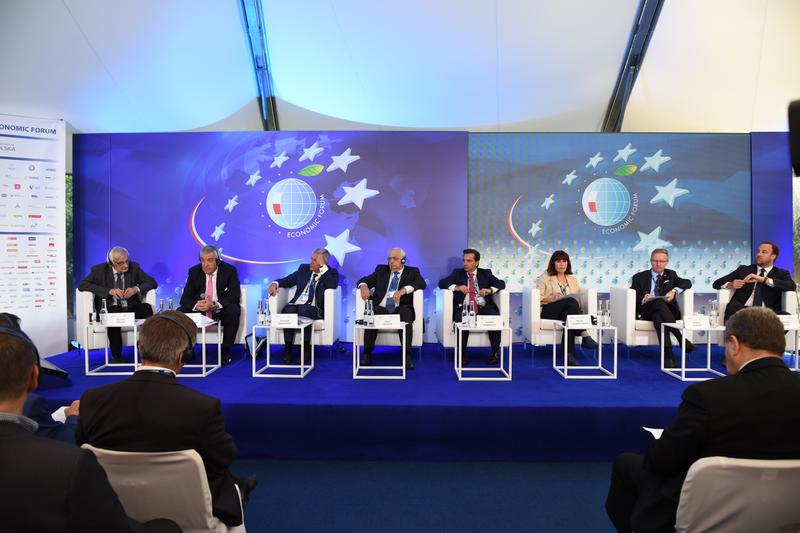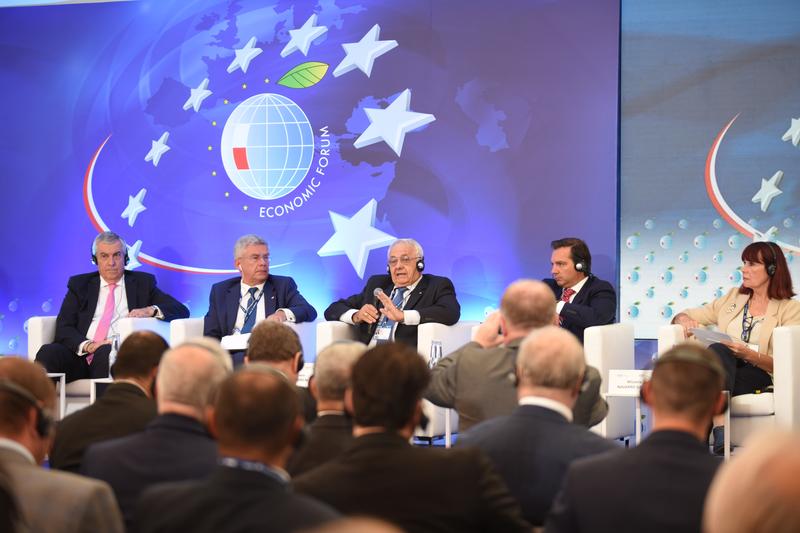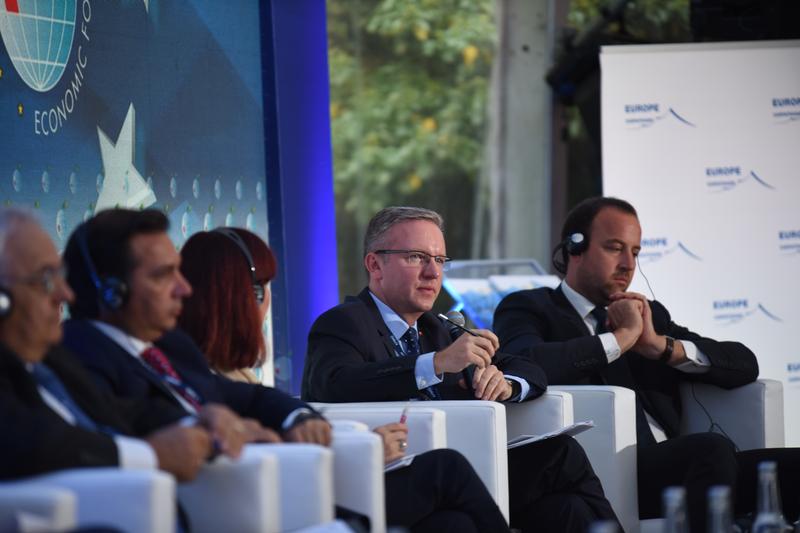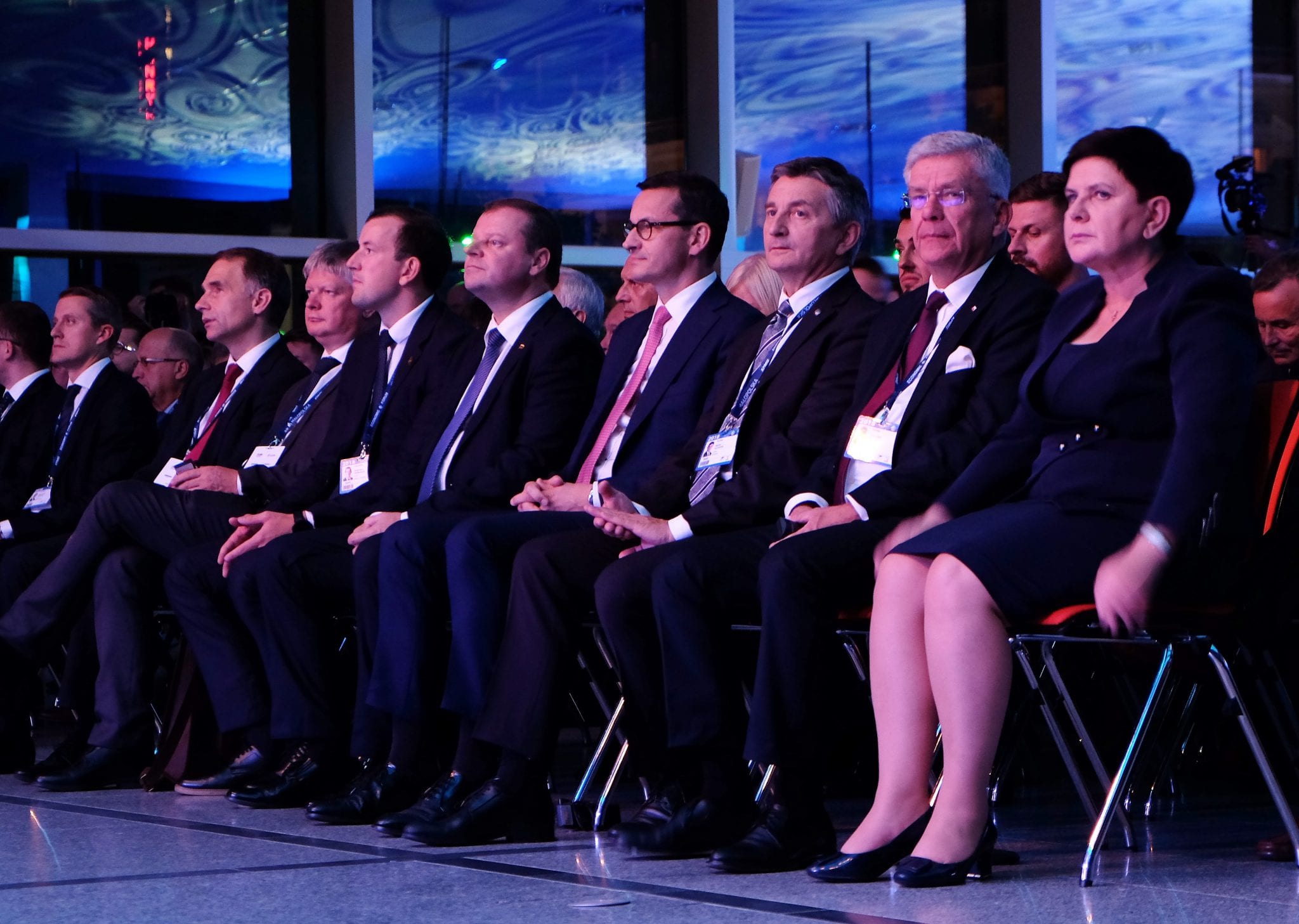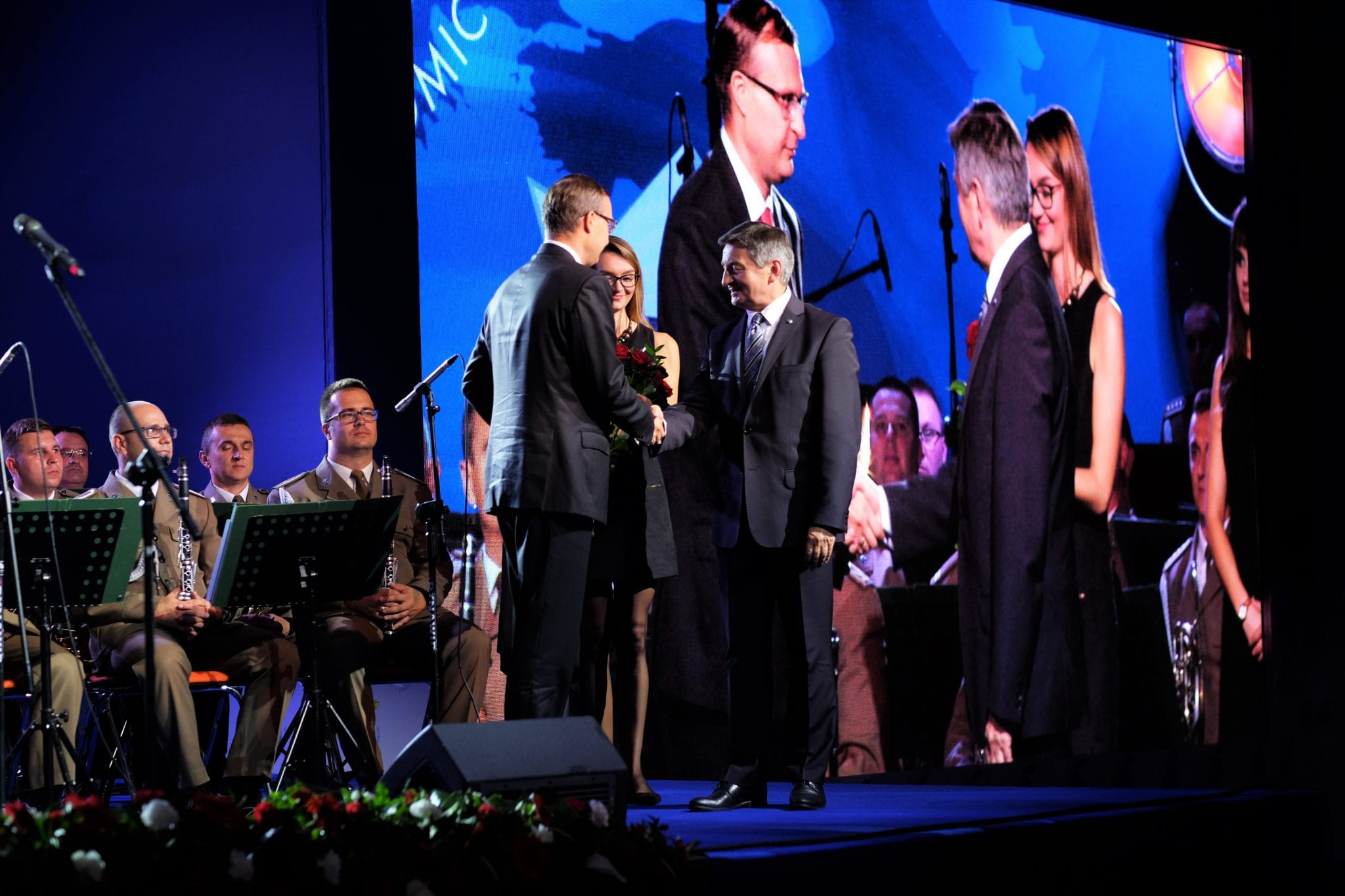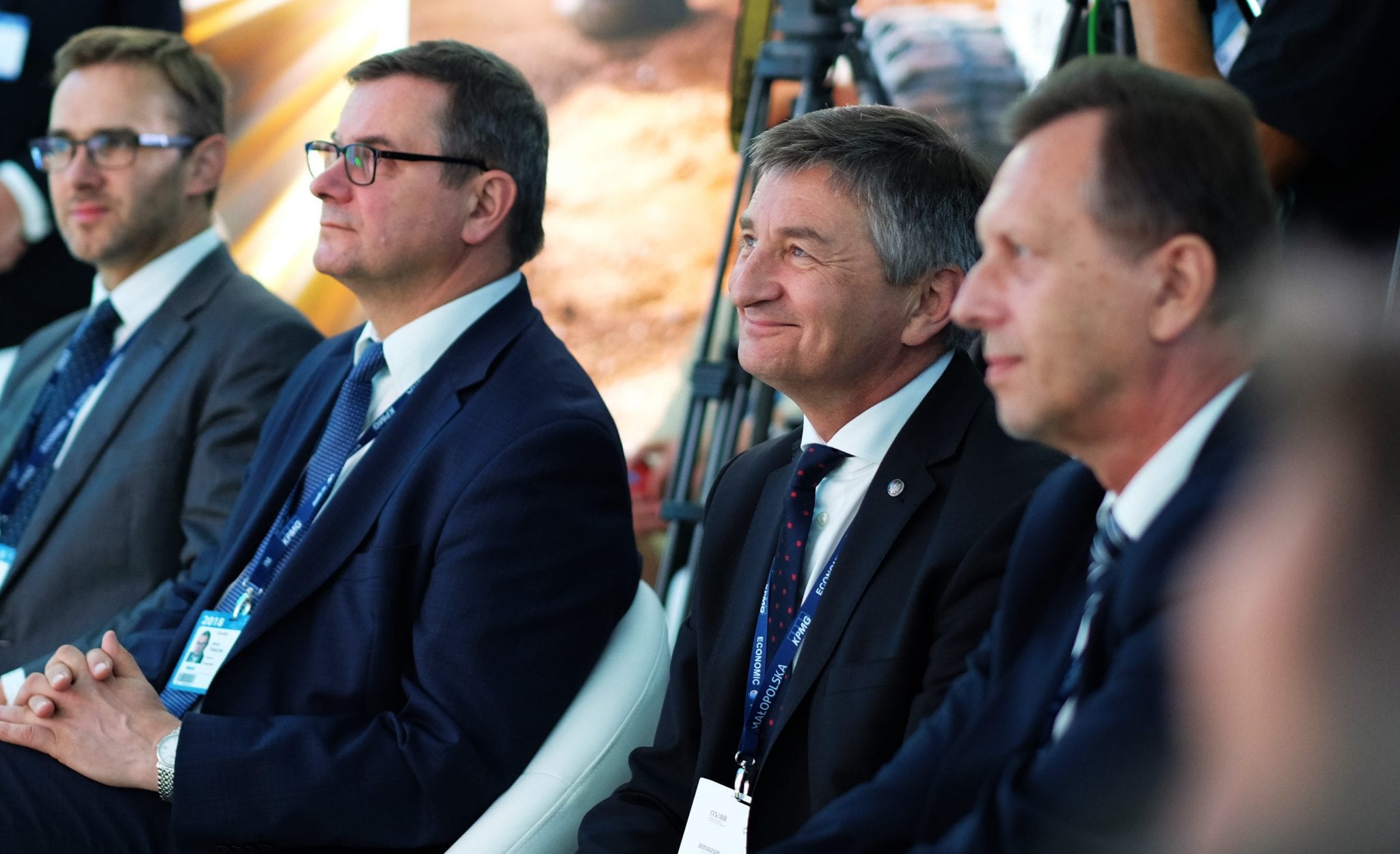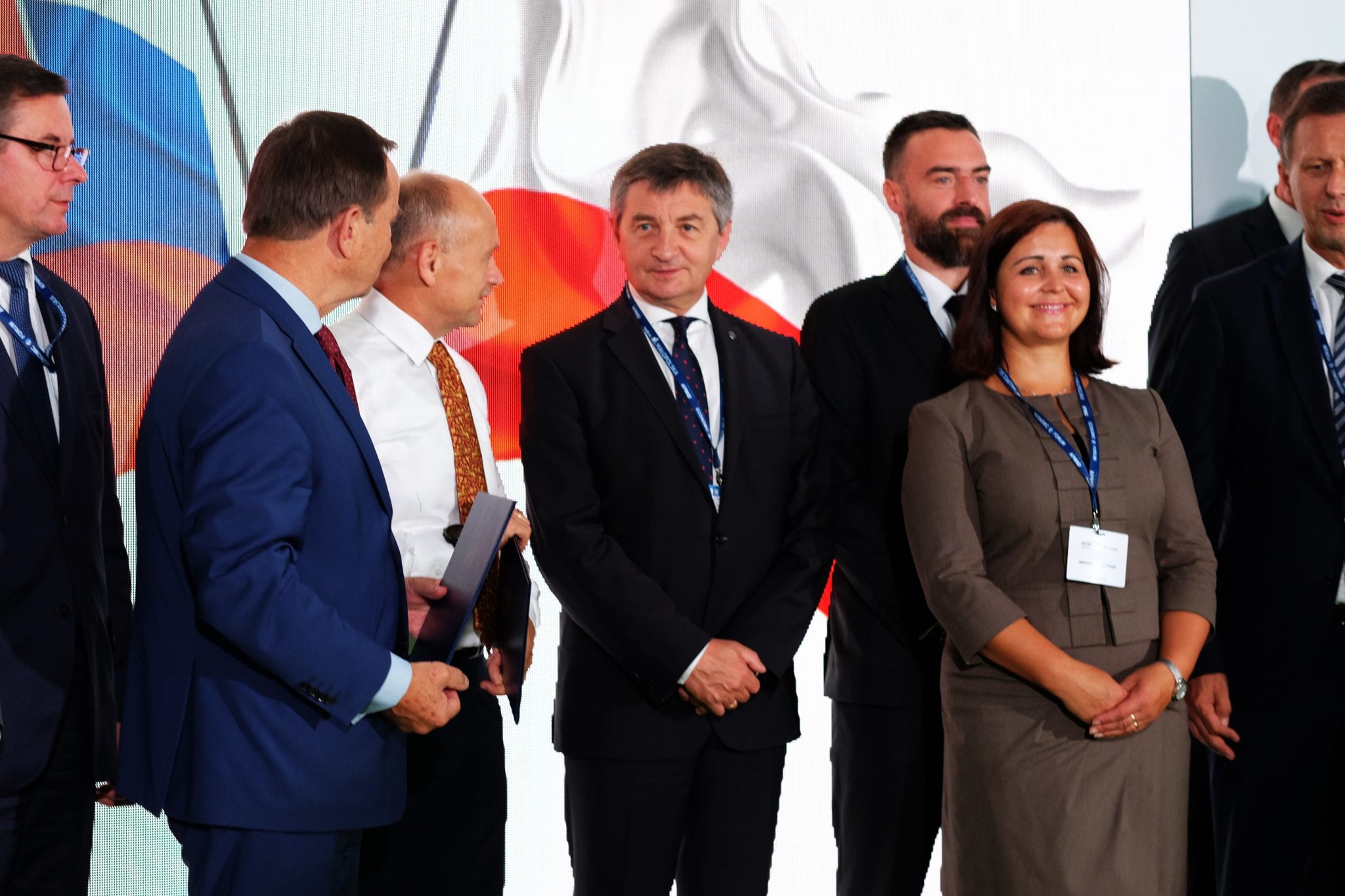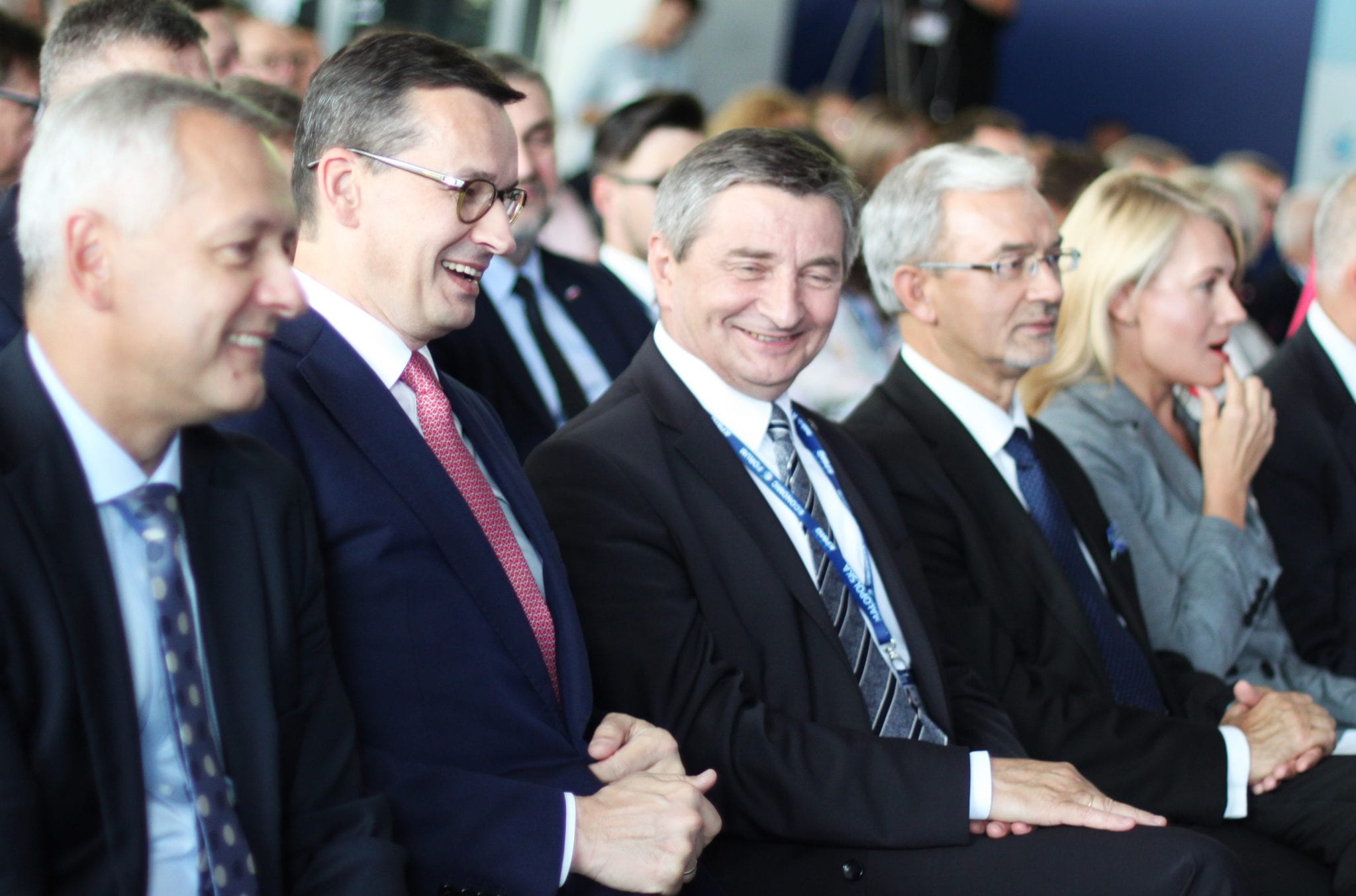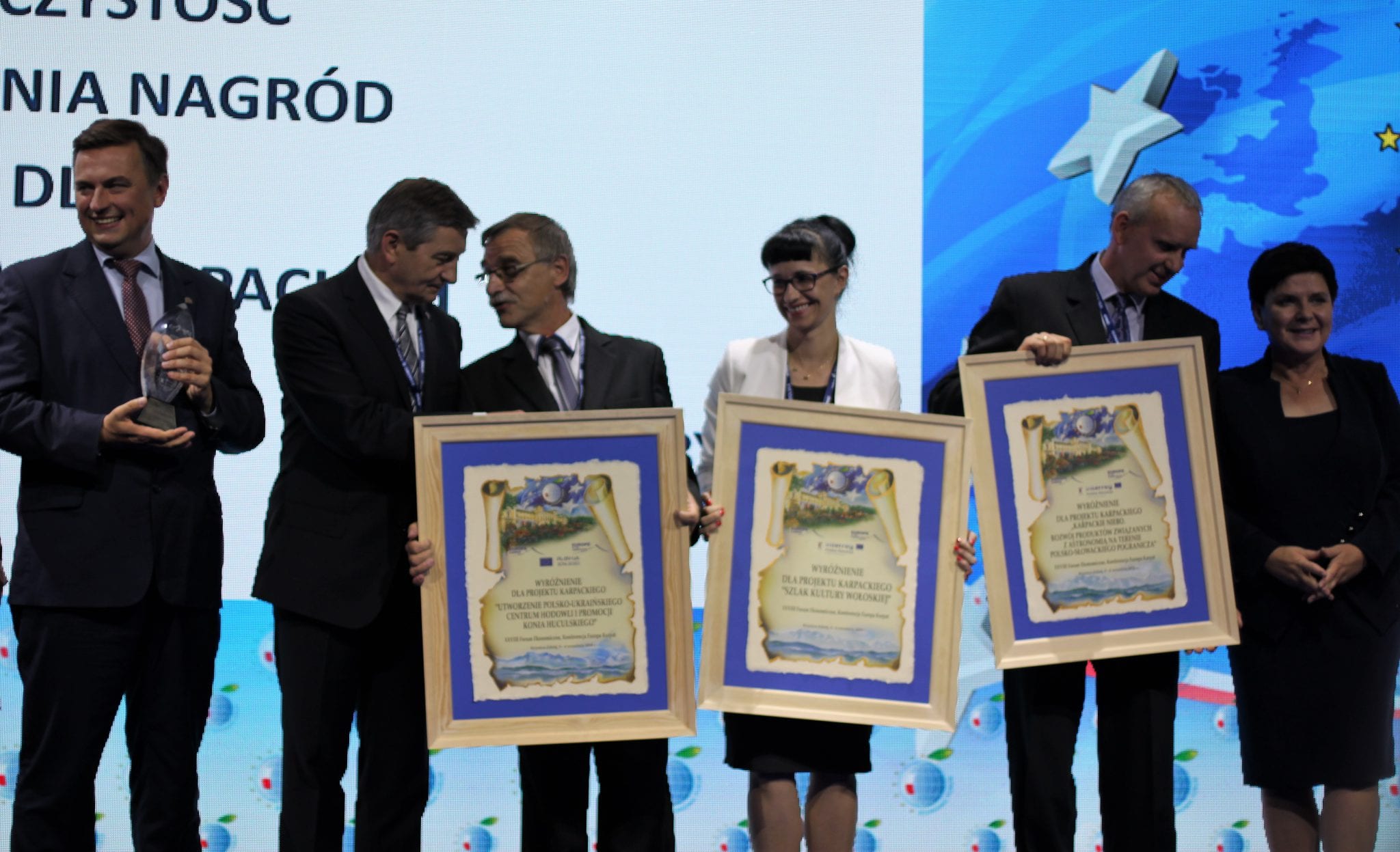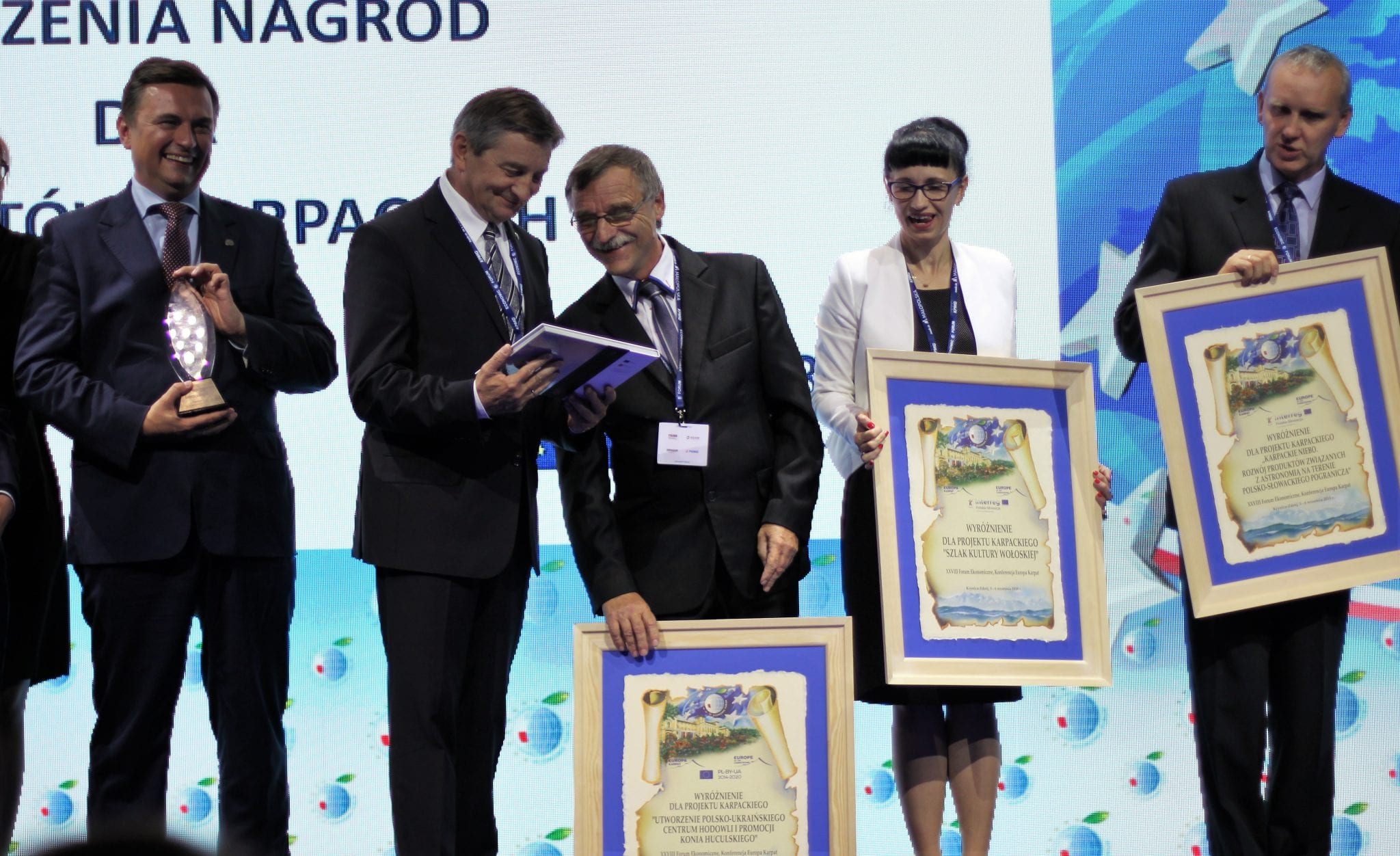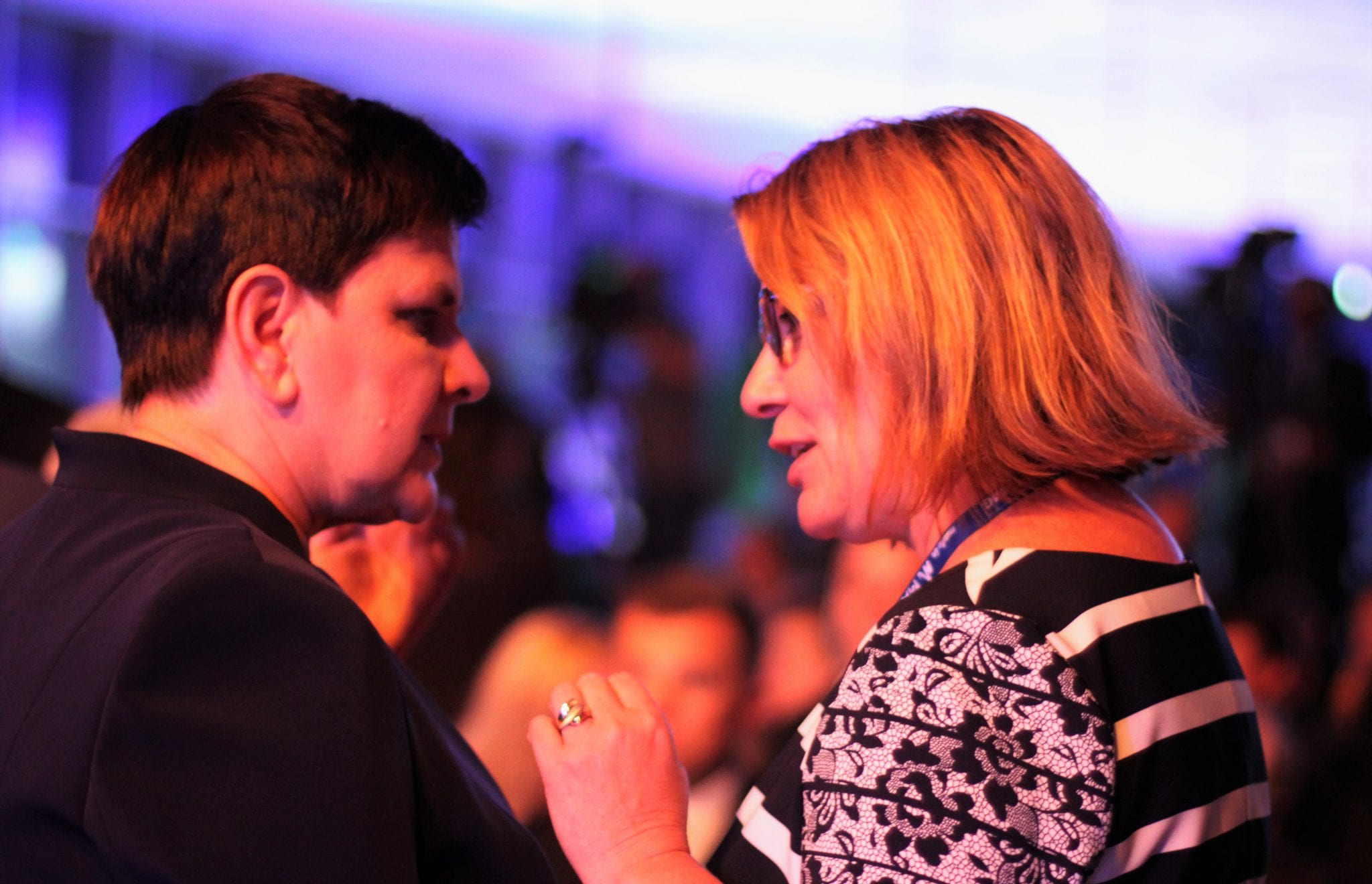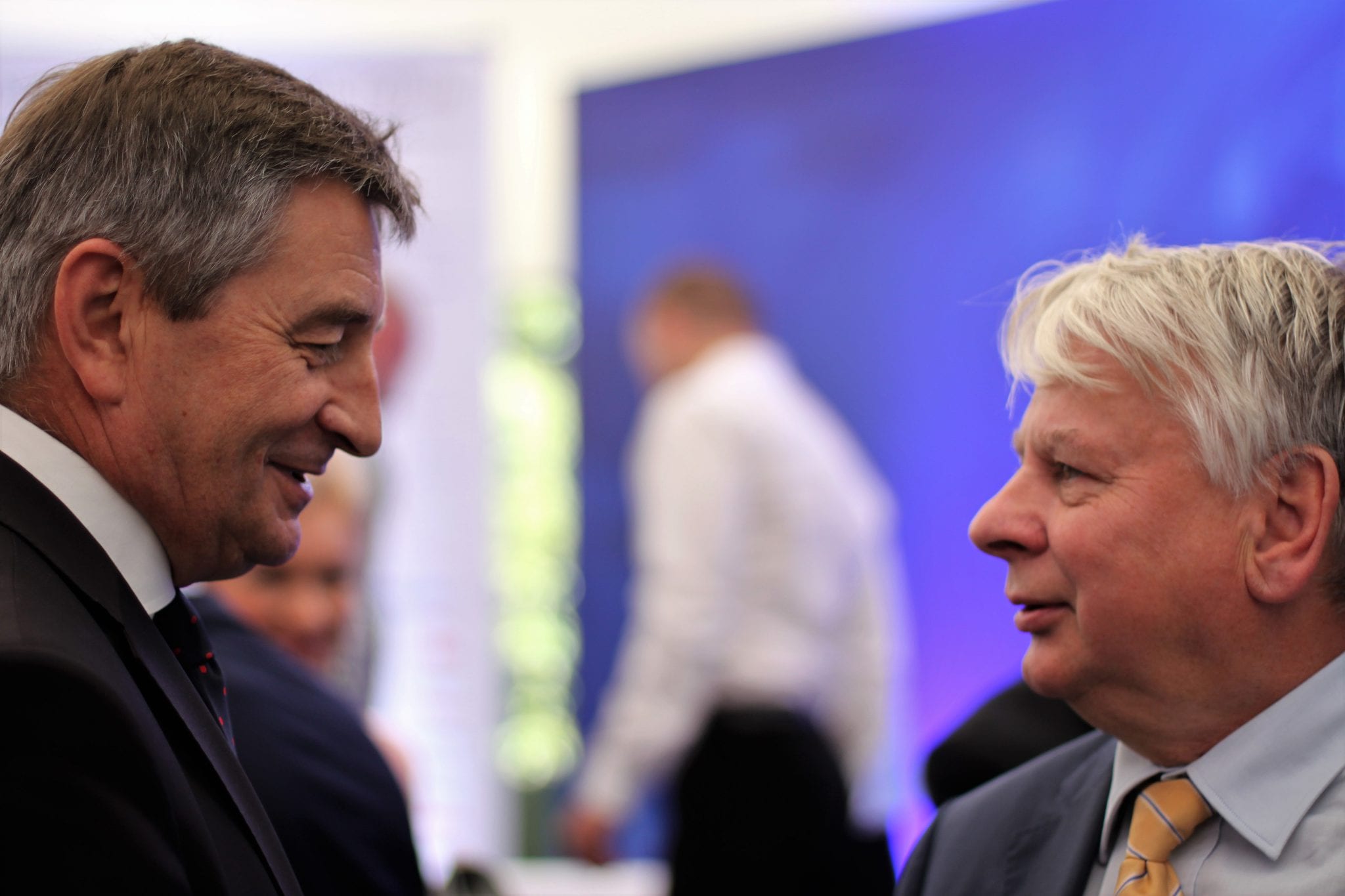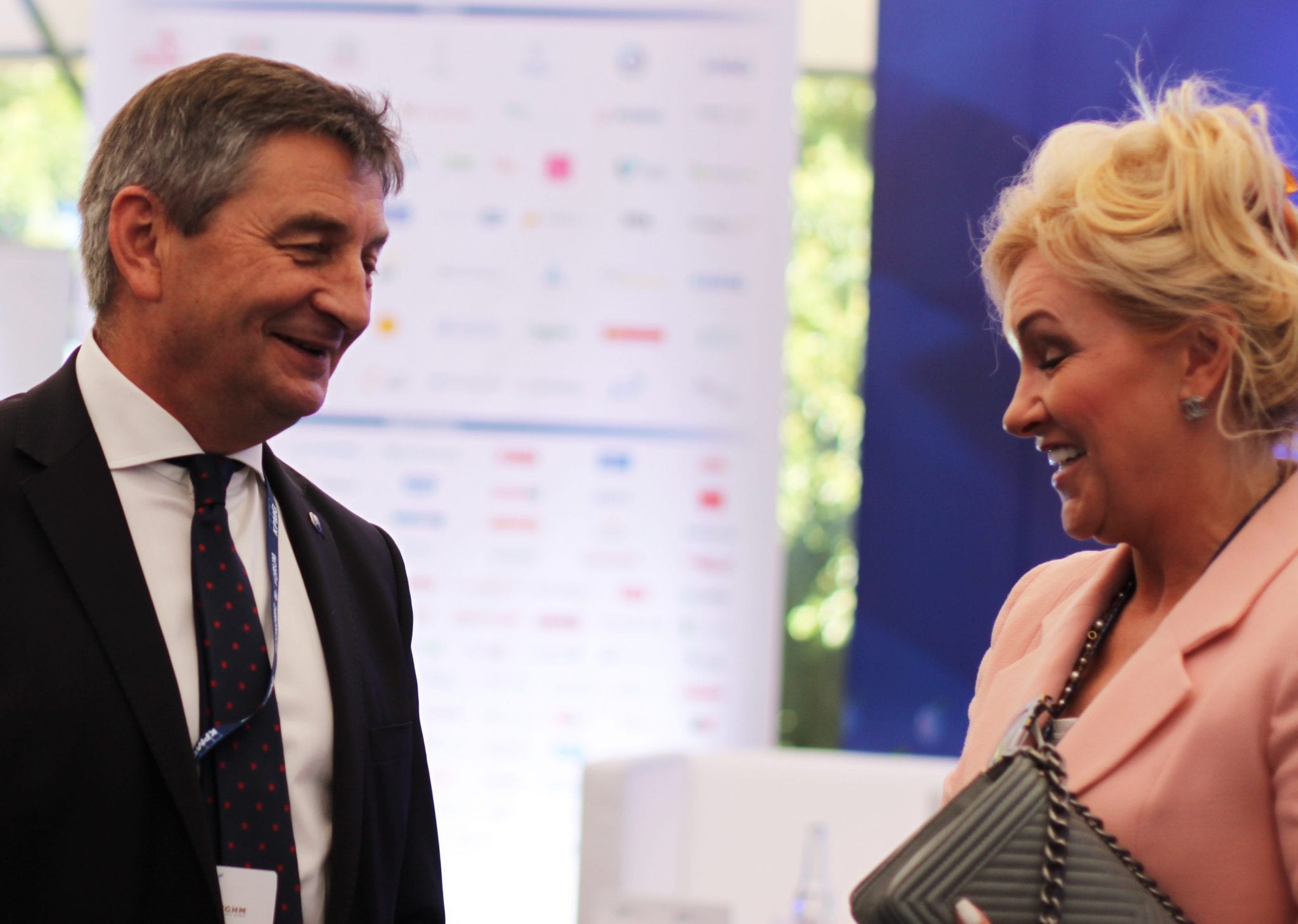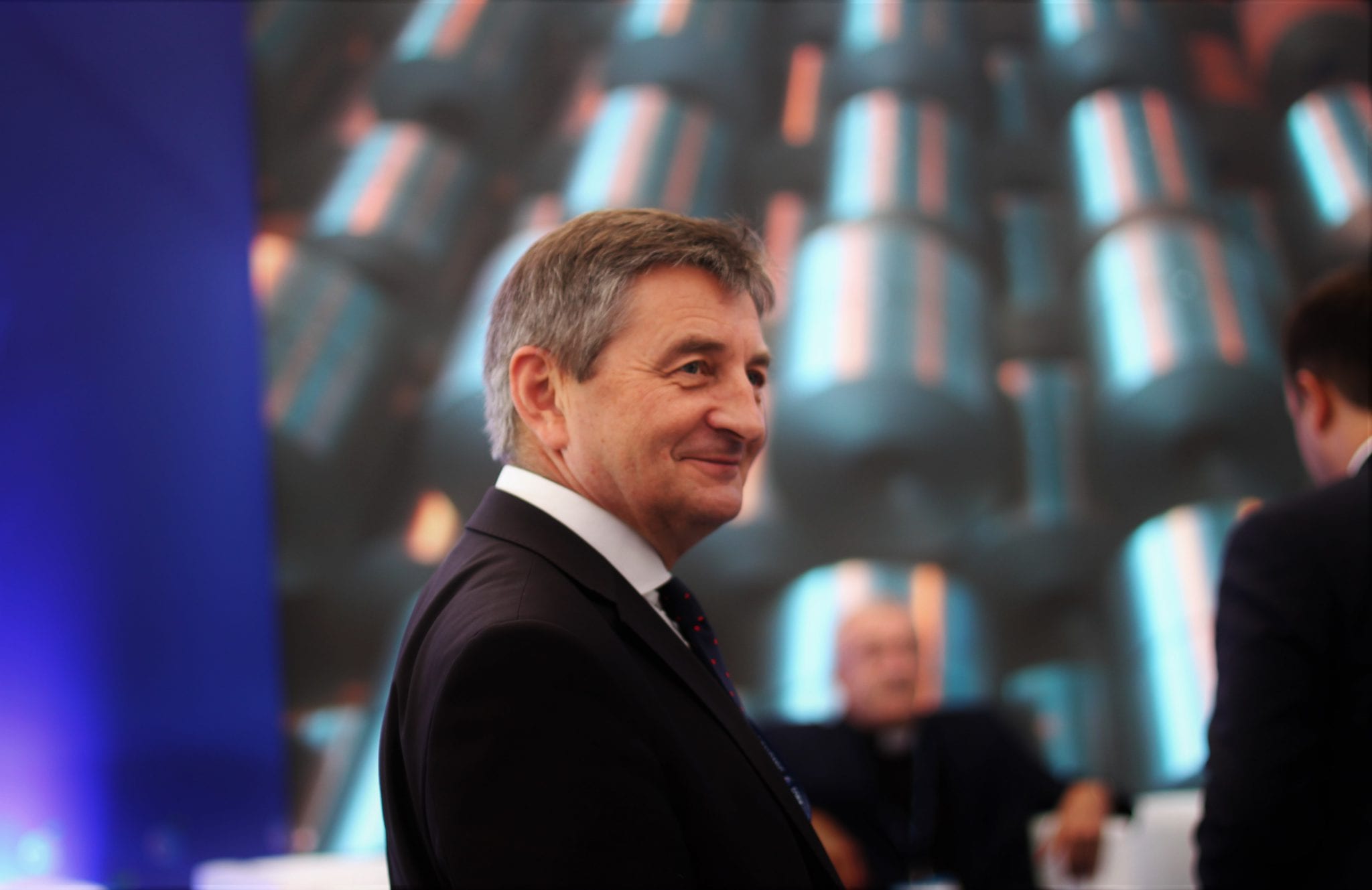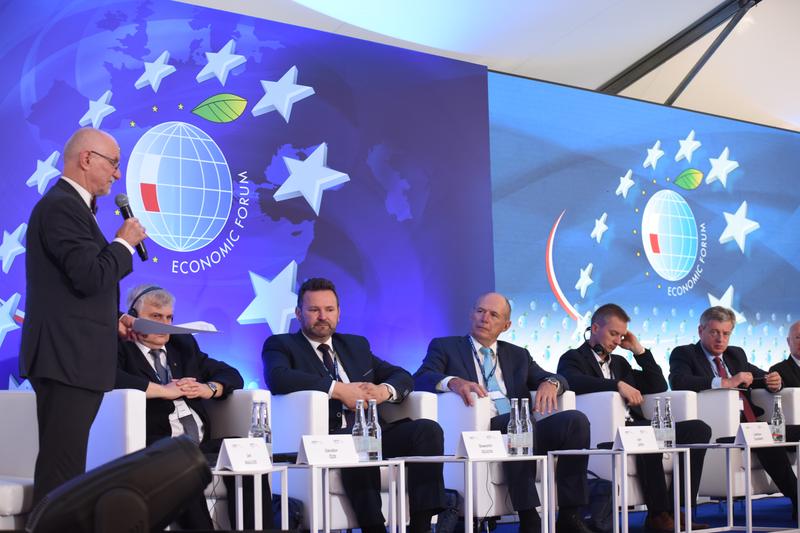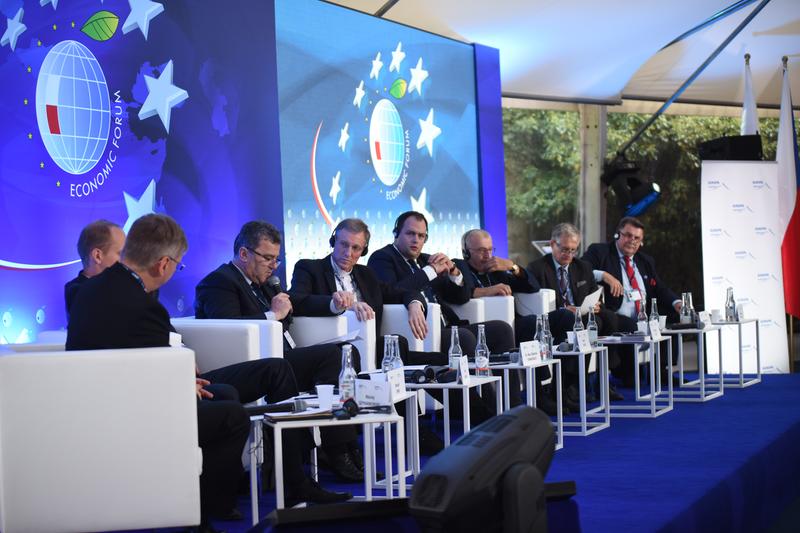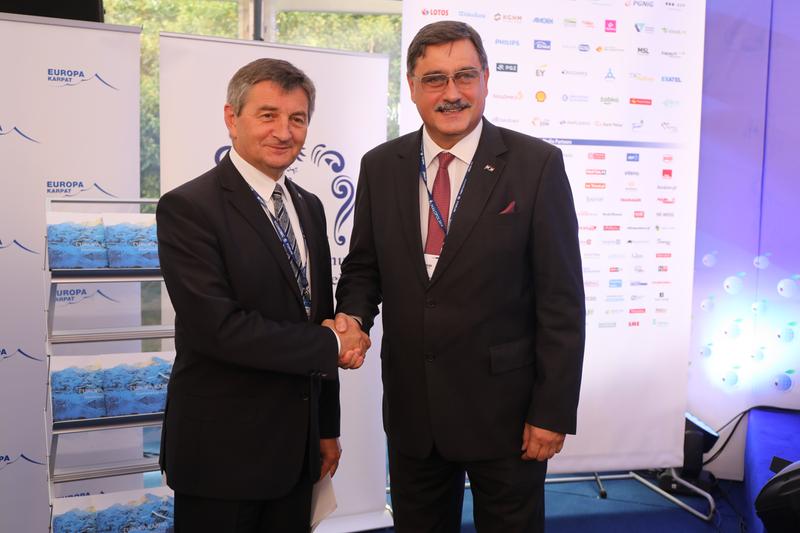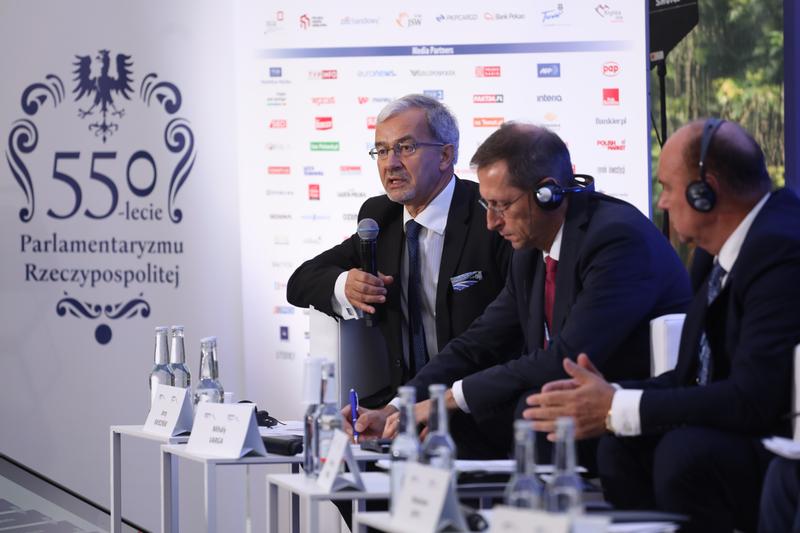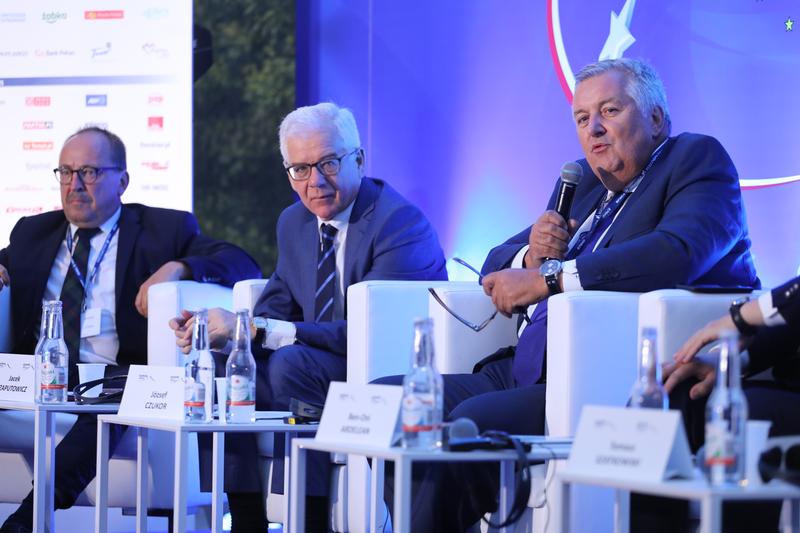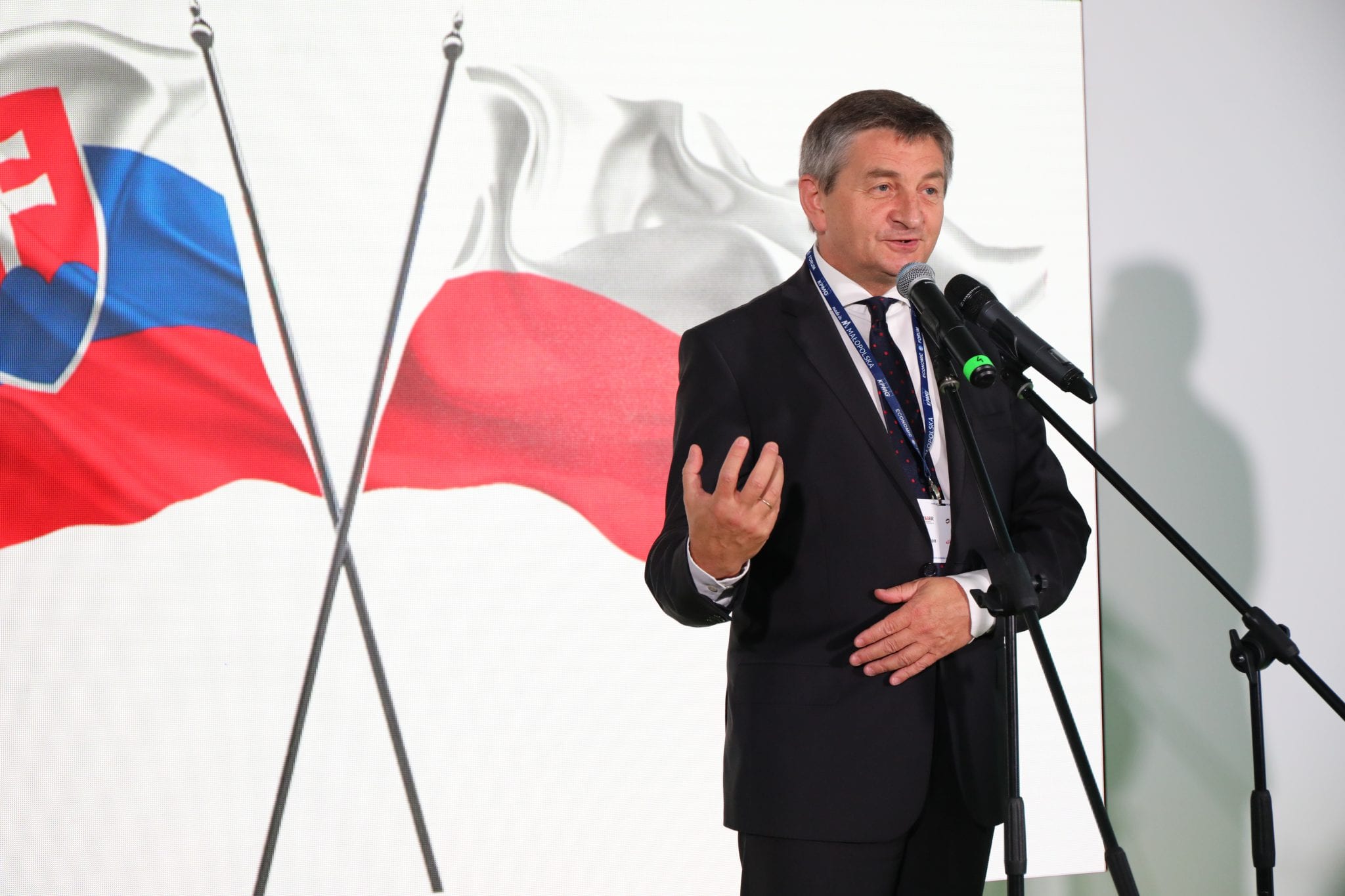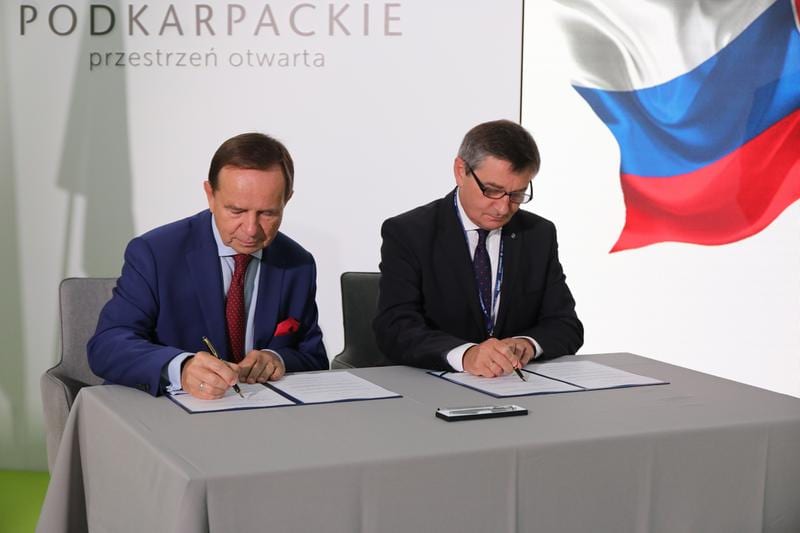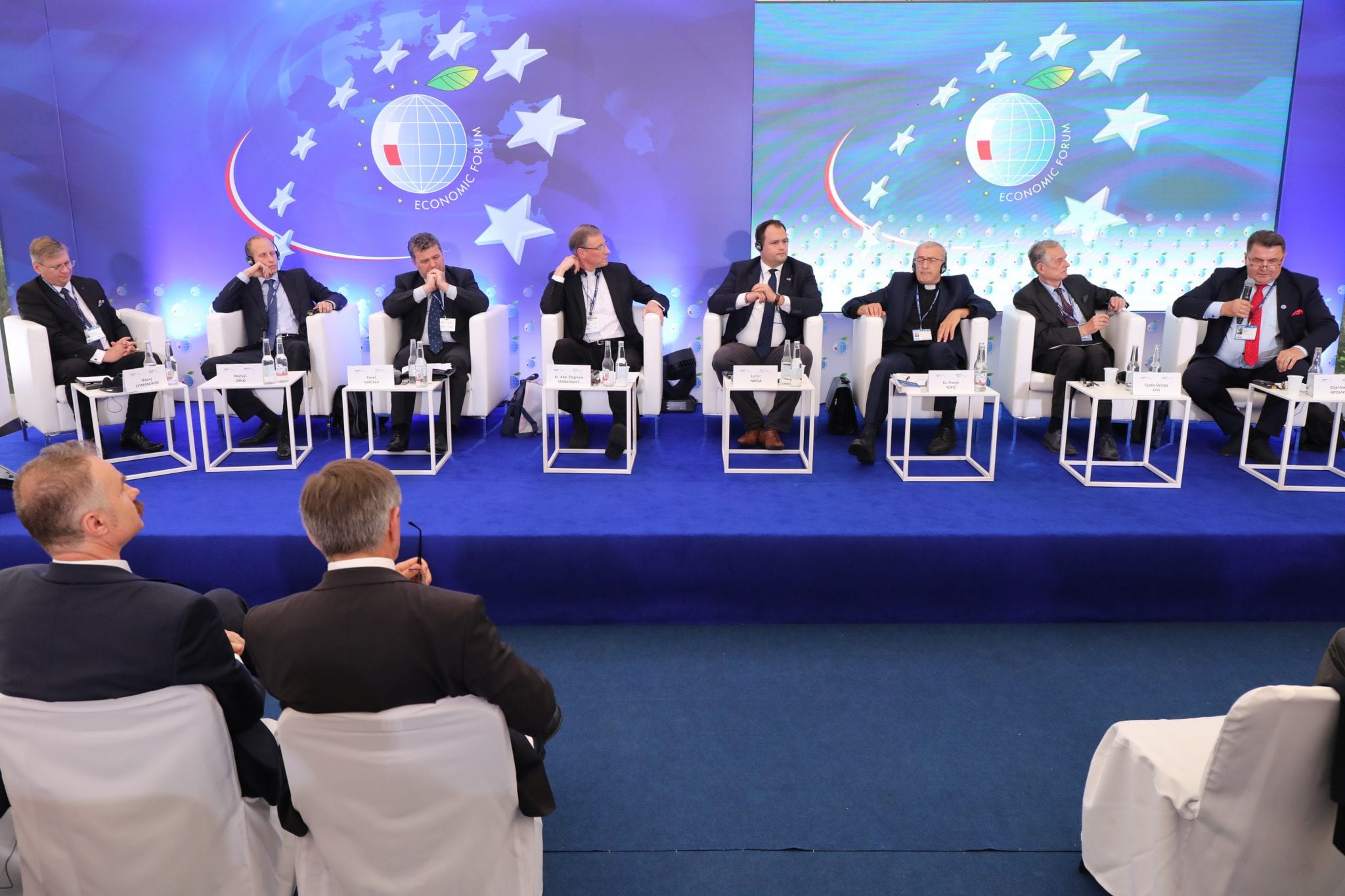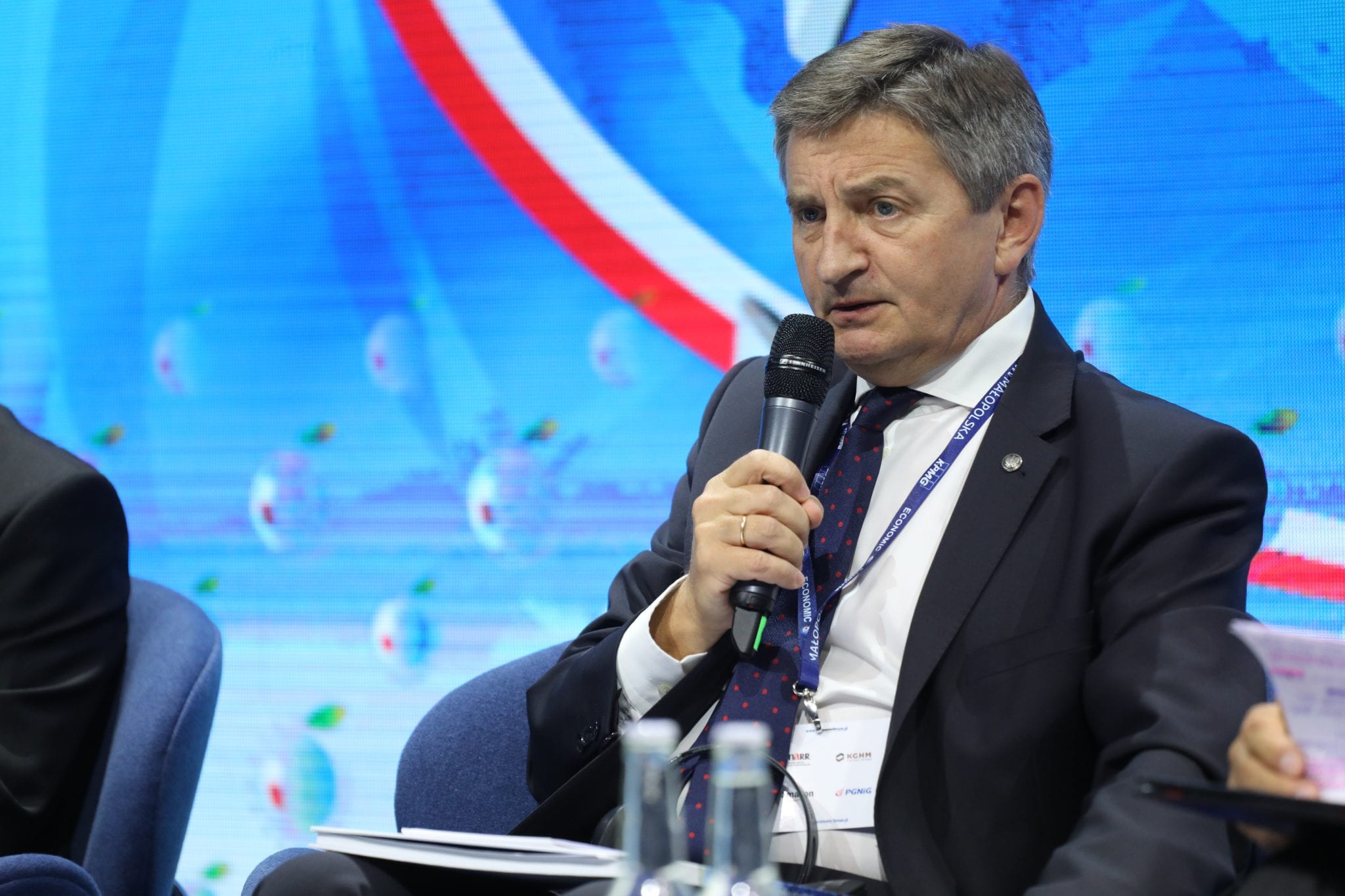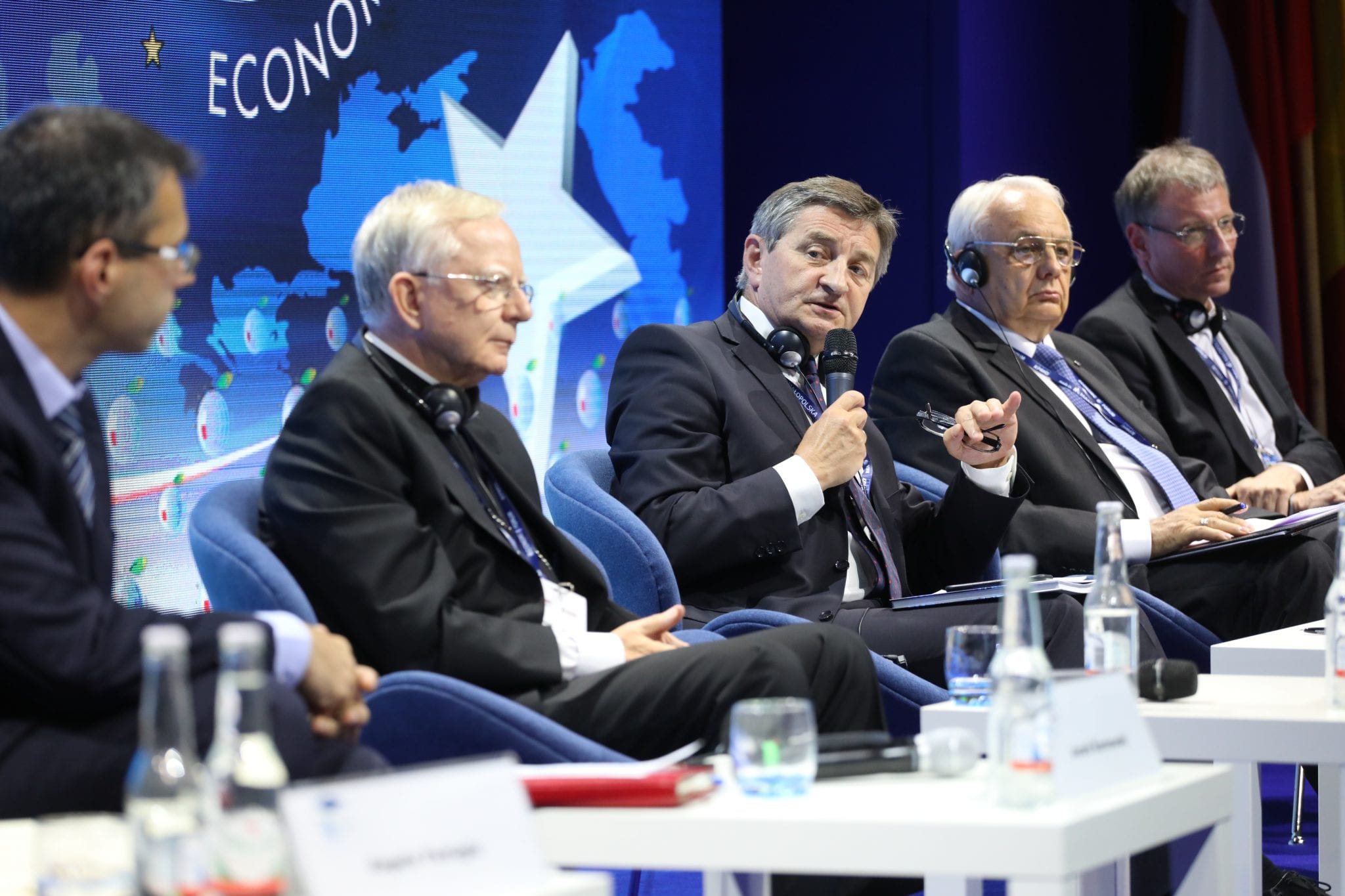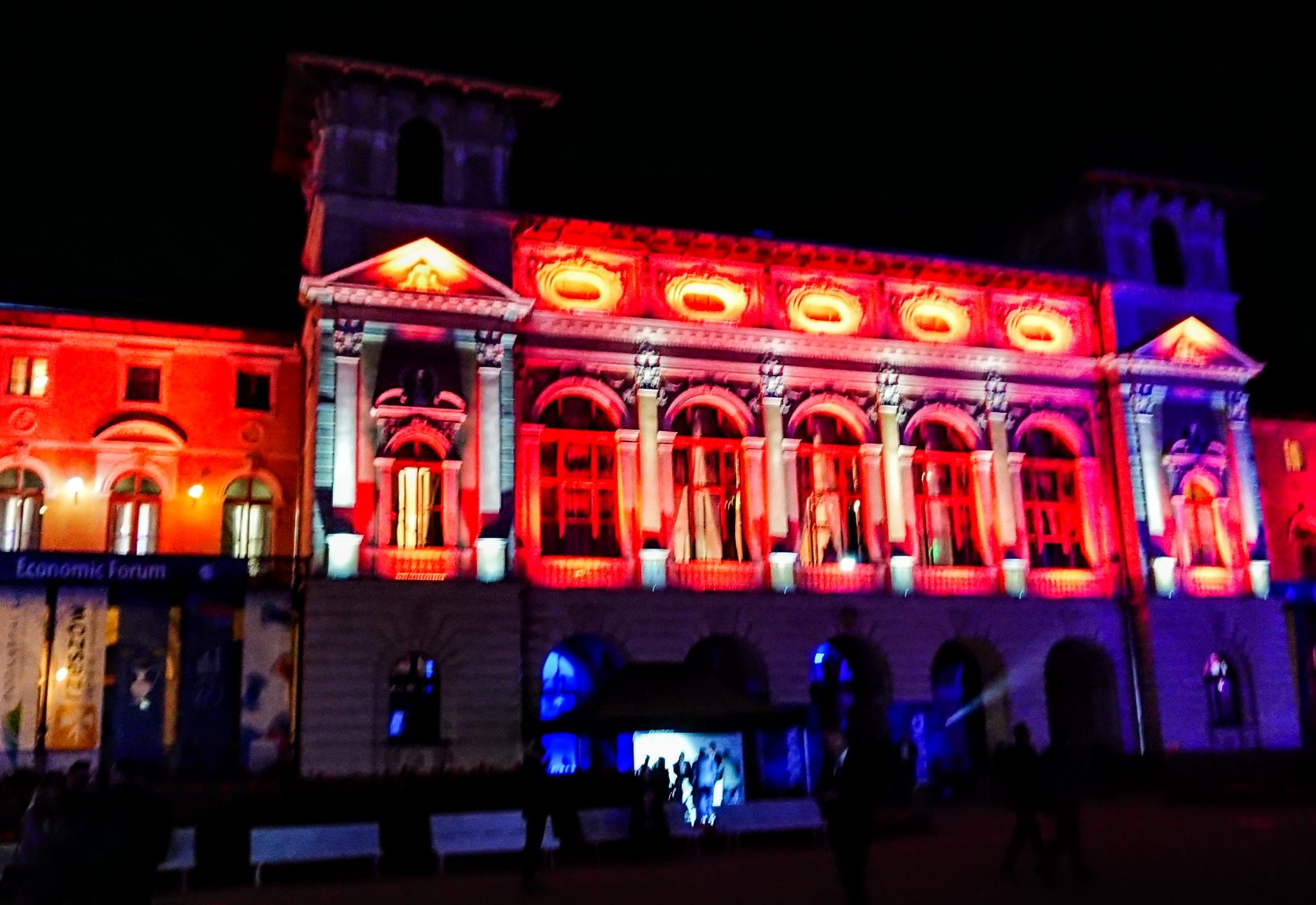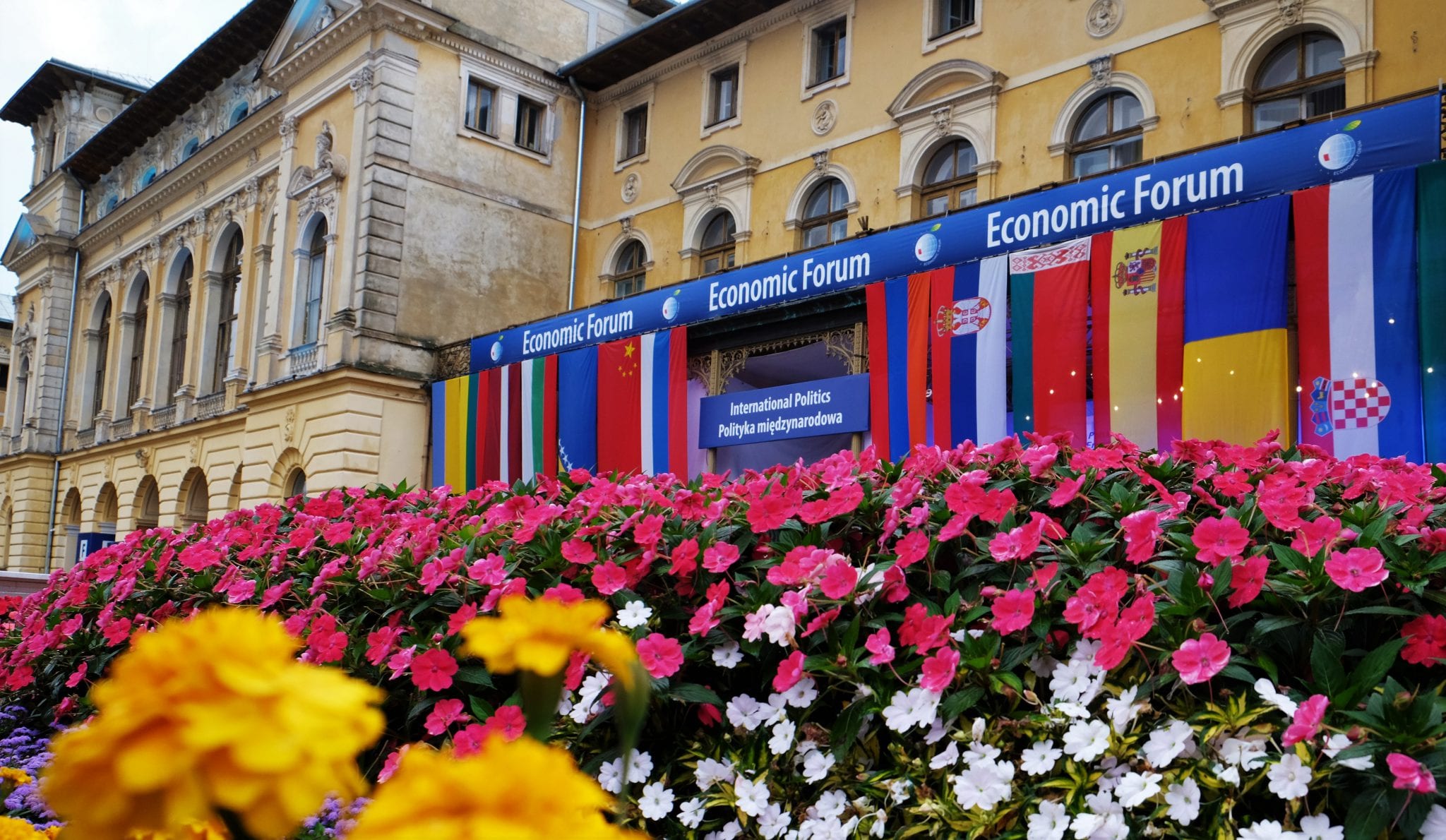The most important Polish and foreign politicians, over eight hours of discussions and a gala during which prizes for the best Carpathian projects were awarded - this is how the first day of the Carpathian Europe Conference went by in a telegraphic nutshell. The event, whose initiator and host is Speaker of the Sejm Marek Kuchciński, is held as part of the Economic Forum in Krynica. This is already the 20th edition of the Conference. - We are finalizing what is a great success concerning the development of cooperation between the countries of Central and Eastern Europe. We would like the conference to become a place to look for positive solutions not only for the Carpathians, but also for the whole Europe - said Marshal Kuchciński while opening the Forum.
Neighbors of Europe or neighbors in Europe?
The first panel dealt with different dimensions of the European Neighbourhood Policy. Among the speakers were Romanian Senate President Calin Popescu-Tariceanu, Senate Speaker Stanisław Karczewski, Deputy Speaker of the Skupstina of the Republic of Serbia, Vice President of the Congress of Deputies of Spain Micaela Navarro Garzón, Vice-President of the National Assembly of Hungary János Latorcai, Secretary of State at the Presidential Chancellery Krzysztof Szczerski, Chairman of the Committee on International Relations and Immigrants of the Parliament of Montenegro Andrija Nikolić. The discussion was moderated by Deputy Speaker of the Senate Ryszard Terlecki. The politicians discussed, among others, migration and the southern and eastern dimension of the European Neighbourhood Policy.
Calin Popescu-Tariceanu spoke first. - We are trying to find solutions to the basics of the migration problem. We are making efforts to educate the public. This is a challenge for parliaments and governments - he said. Speaker Karczewski, in turn, stressed the importance of the Carpathian Europe, which in his opinion provides ample opportunity for dialogue. - We know where the geographical border is, but it is important to answer the question where the cultural border is. Europe changes, surprises us. The situation on the continent is dynamic. The border of Europe is also influenced by the situation in the European Union, the way it operates, and whether it will be a multi-speed Union," Stanisław Karczewski remarked.
According to János Latorcai from the Hungarian National Assembly, the European Union should be an organization of strong nation states, based on the values of Greek, Roman and Christian culture. - We have to think about maintaining this community, because no country can stop migration alone. Let's conduct such a neighbourhood policy, which is connected with the national policy - the Hungarian politician pointed out. Vladimir Marinkovic spoke about the Serbian point of view on migration policy. - We need to talk with our colleagues from the Carpathian region and Eastern, Central and Southern Europe and about how to respond dynamically to the crisis we are facing, to create new strategies on migration policy. Marinkovic noted that Serbia is undertaking many activities with partners from the European Union in this area, especially with countries from southern, eastern and central Europe, to find a solution related to the problem of migration and the protection of our civilization, cultural heritage, Christianity.
The Vice President of the Congress of Deputies of Spain spoke in a slightly different tone. Micaela Navarro Garzón pointed out that the rights and obligations in the Union should be balanced. - The European Union needs a global reflection in order to face the problem of migration with solidarity - said the Spanish politician. Krzysztof Szczerski drew attention to the fact that Europe perceives its surroundings as a source of disintegration and threat. - Not only the issue of the migration problem, but also the Russian policy is a source of destabilization for Europe. It is a consequence of wrong political decisions of individual countries. Therefore, there should be no agreement that these decisions should be popularized and treated as a model for the whole of Europe," Minister Szczerski appealed. Andrija NIkolić from the Parliament of Montenegro emphasized that in the matter of migration the European Union needs a new strategy that protects social values. He also declared that Montenegro should join the EU as soon as possible. - The accession of the Western Balkans planned for 2025 is an ambitious plan, we are preparing for it using the experience of the Visegrad Group.
Development in the Carpathians - Development around the Carpathians
In the second panel the participants discussed the future of the Carpathian macro-regional strategy. The event will be attended by the representatives of the Director General of the Central Coordinating Body in the Office of the Deputy Prime Minister for Investment and Information of Slovakia Denisa Žiláková, the Mayor of Kežmarok Ján Ferenčak, Head of Unit in the Directorate General for Regional Policy of the European Commission Jean Pierre Halkin.
Deputy Prime Minister Varga pointed out that it is extremely important to create connections in the field of energy and road infrastructure. - We started the Carpathian initiative because we want to connect with each other. We need to have a clearer border and remove the barriers that hinder us every day - he said. Dan Octav Paxino, on the other hand, noted that the Carpathians are a unique region in terms of economy, culture and ecology. The Romanian politician also thanked the Polish government for its cooperation in creating the Carpathian strategy. - We will continue to participate in it - Paxino announced.
Oleksandr Hanushchyn emphasized that the development of the Carpathians is one of the main issues discussed in Ukraine. - We want to carry this flag, this banner together with you, shoulder to shoulder, and I hope that together we have a great opportunity for success in a joint European strategy with the macro-regional Carpathian strategy - said the chairman of the Lviv Regional Council. Denisa Žiláková expressed her conviction that the macro-regional strategy will bring many benefits to many regions. - Not only in investment, in the field of tourism, smart technology, mainly in the field of infrastructure. There we will see these benefits - assured the Slovak politician.
According to Mayor Ferenčák, the Carpathian strategy is complete and addresses the challenges facing this part of Europe. - It is important that the plan starts from the lowest level, then through the local, national to international level. Its most important goal is to improve the life of the region's inhabitants - he assessed. According to the representative of the European Commission, the Carpathian Strategy is a very good instrument that will bring many benefits to the EU. - From the EU perspective it is also important that this is a bottom-up initiative. We have to think how to administratively strengthen the Carpathian Strategy, which is an important political step. In the nearest future we should prepare a schedule of discussions - said Jean Pierre Halkin.
Central Europe - infrastructure under reconstruction
Road, railroad and transport investments were the topic of the third panel. It was attended by six speakers of ministerial rank: Andrzej Adamczyk, Minister of Infrastructure; Rokas Masiulis, Minister of Transport and Communications of the Republic of Lithuania; Árpád Érsek, Minister of Transport and Construction of the Slovak Republic; Volodomyr Omelyan, Minister of Infrastructure of Ukraine; Dan Ťok, Minister of Transport of the Czech Republic and Péter Szijjártó, Minister of Foreign Affairs and Trade of Hungary. The discussion was moderated by Bogdan Rzonca, Chairman of the Infrastructure Committee of the Sejm.
- Yesterday and today we confirmed to each other: in transport matters we are together. Together we will remove all obstacles that stand in the way of creating a network of not only road but also rail transport, which will allow the development of our regions. These investments include Via Carpatia, Via Baltica, Rail Baltica, express road S3 - Andrzej Adamczyk described the undertakings. Rokas Masiulis added that the EU help and support for Via Carpathia route means a lot. - This is a very important project, which will allow to move faster, safer and integrate with the business environment. This will be an excellent potential for the whole of Europe - pointed out the Lithuanian politician.
- The Slovak Republic supports both the Via Carpathia and the high-speed railroad projects. We are a part of these projects - said Árpád Érsek. In turn, Volodymyr Omelyan presenting the position of Kyiv expressed hope that this project will permanently connect Ukraine with Europe. - In transport matters we are together. Together we will remove all obstacles that stand in the way of creating a network of not only road but also rail transport, which will allow our regions to develop. These investments include Via Carpathia, Via Baltica, Rail Baltica - supplemented Dan Tok, Minister of Transport of the Czech Republic. - In 2023 the Hungarian section of Via Carpathia will be an express road, and in September next year we will present a document on high-speed railroad between Warsaw and Budapest - declared Peter Szijjarto, the head of Hungarian diplomacy.
The panel was followed by a signing ceremony for the Joint Ministerial Statement on major infrastructure projects in the CEE region.
"Quo vadis, Europe?" - directions of European development and the future of the European Union
Another Wednesday panel discussed the future of the Old Continent and was moderated by Professor Zdzisław Krasnodębski, Vice President of the European Parliament. The participants were: Richárd Hörcsik, Chairman of the Committee on European Affairs, David Engels from the Free University of Brussels, Waldemar Paruch representing the Centre for Strategic Analysis, Aleksander Tomsky, Managing Director of Leda Publishers from the Czech Republic, and Aymerick Chauprade, French MEP.
- The political mistakes of certain countries are universalized. Germany is testing how strong it is in Europe. It is difficult to decipher what values the Union has, which today finds itself between great ambitions and systemic crisis. The problem is diagnosing systemic problems - analyzed Prof. Paruch. - We need real democracy and we must take into account what Central European countries, which are after all fully-fledged members of the European Union, are saying - added Aymerick Chauprade. In turn, Richárd Hörcsik emphasized the European threat of "political dispersion". - The most important issue is the migration crisis, also in the financial perspective. Asking the question "Where is Europe going" we have to wait until the European Parliament elections in May 2019. - he concluded.
- Instead of creating artificial compromises between autonomy and what Brussels and the European Commission can do, we need to reduce the number of strategic co-competences that uphold policies on borders, social issues - said David Engels. According to Alexander Tomski, the biggest challenge at the moment is migration. - This is a huge problem because the nomenklatura in Brussels believes in an open Europe, in open borders. Not recognizing that breaking a border is an aggression can lead to serious problems - said the Czech.
Silent pubes - how to ensure political security in the Carpathian Europe?
The last panel of the first day of the Carpathian Europe Conference focused on the security issues of the region. The debate was moderated by Zsolt Nemeth, Chairman of the Foreign Affairs Committee of the Hungarian National Assembly. Among the panelists were: Jacek Czaputowicz, Minister of Foreign Affairs; József Czukor, Chief Advisor on Foreign and Security Policy, Office of the Council of Hungary. Among the panelists were: Jacek Czaputowicz, Minister of Foreign Affairs; József Czukor, Chief Advisor on Foreign and Security Policy, Cabinet Office, Hungary; Ben-Oni Ardelean, Deputy Chairman of the Chamber of Deputies of the Romanian Parliament; Tomasz Szatkowski, Undersecretary of State, Ministry of National Defense; Martin Fedor, Chairman of the Slovak-Polish Parliamentary Group in the National Council of the Slovak Republic; Lolita Čigāne, Chairwoman of the Committee on European Affairs, Parliament of Latvia; Miro Kovač, Chairman of the Foreign Policy Committee, Parliament of Croatia; Jan Farsky, MP, Chamber of Deputies, Czech Republic.
Minister Czaputowicz noted: - Political security refers to threats to the social stability of states and governments. The point is that countries in the region should be able to manage their own affairs without the influence of geopolitical forces that impose an international order and hinder the realization of interests. Zsolt Nemeth, in turn, emphasized that apart from regional players we can also talk about global players influencing Central and Eastern Europe. As he pointed out, countries have to defend their own interests, but also think about intensive cooperation in the context of the Carpathian Europe, Tri-City and Visegrad Group. A slightly different opinion was expressed by Mr Farsky, who explained that Carpathian Europe should not be a counterbalance for other regions of the continent.
Speaking on behalf of the Croatian Parliament, Miro Kovač stressed that the way of thinking of the Central European nations should be respected.- I am convinced that we will manage to work out a model that will satisfy the needs in both old and new countries. Without this we will not have enough strength to cope with external powers whose interest is to have a strong position in Europe - he pointed out. - In a globalised world, it is in our common interest to create a secure environment - added Martin Fedor. Tomasz Szatkowski also took the floor in the discussion. - For Poland military potential is a fundamental issue of sovereignty. Security is defined by threats and challenges. One of them is the aggressive policy of Russia, new threats are terrorism, migrations - said the Deputy Prime Minister. The vice president of the Romanian parliament said in turn economic development will ensure security. - In Romania all parties agreed that we should raise our contribution to NATO from 1.2 to 2 percent of GDP. To do this we must have economic growth. It is important to look at Europe as a huge project. The EU and NATO are two important organizations. We are all in them. We believe that we need platforms for our defense and for sharing our economy because it will all benefit us," he pointed out.
Awards for Carpathian projects
The culmination of the first day of the Europe of the Carpathians Conference was the presentation of awards for the Carpathian projects, which were given during the ceremonial gala by Marek Kuchciński, Speaker of the Sejm. The main prize went to the Przemyśl Fortress project. Projects were also awarded: Trail of Wallachian Culture, Polish-Ukrainian Centre for Breeding and Promotion of Hucul Horse, Karpackie Sky. - This year we have made a huge step in the development of regional policy, in all areas - said the Speaker of the Sejm to the winners.
Signing a letter of intent on the organization of the Poland-Slovakia Forum was the main point of the second day of the Carpathian Europe Conference, held as part of the XXVIII Economic Forum in Krynica. According to the document, it will be held in 2019 at the G2A Arena Exhibition and Congress Centre in Jasionka near Rzeszów. The organizers of the event will be the local government of the Podkarpackie Voivodeship and the Foundation Institute for Eastern Studies. - This agreement is an example of that. It is also a new stage of Polish-Slovak cooperation - said Marek Kuchciński, Speaker of the Sejm, after signing the letter. Moreover, on Thursday, scientists, local government officials and politicians participated in four panel discussions.
Paths of the Sages - Collegium Carphaticum
Thursday began with a panel on the Carpathian region academic cooperation project, Collegium Carphaticum, moderated by Jan Malicki, Director of the East European Studies at Warsaw University. Among the speakers were Sándor Őze, director of the History Institute at the Catholic University of Budapest, Sławomir Solecki, vice rector of the State Eastern European University in Przemyśl, Jan Lata, rector of the University of Ostrava, Ladislav Šuhányi, vice rector of the University of Prešov, Igor Cependa, rector of the National University of Transcarpathia in Ivano-Frankivsk, and deputy rector of Stefan III Velikivsk University in Suceava.
Sándor Őze emphasized the great significance of Collegium Carphaticum as a valuable academic and scientific initiative for the entire region. In turn, PWSW Vice-Rector Sławomir Solecki emphasized the need to build good relations with neighbors. - We want Przemyśl to become a center from which the Carpathian idea will radiate," said Solecki. - Both the conference and lectures in 2018 show how much interest there is in Collegium Carphaticum, he added.
Ladislav Šuhányi also expressed his pleasure in supporting this project. - We are very pleased that this academic year there will be an exchange of lecturers within the Collegium Carphaticum. Thanks to this support and the successful project, we will be able to achieve higher goals than the ones we are pursuing at the moment. According to the Rector of the University of Ostrava Jan Lata, the essence of the Collegium is the Carpathian idea. - I very much appreciate the fact that the Polish political representation supports this concept. I think that it has a great chance to succeed - he said. - We have a great idea on which we can base ourselves. We are trying to develop our relations in the historical and ecological aspect, and we care for the development of tourism," supplemented Igor Cependa. Stefan Purici, in turn, drew attention to the need for the development of cross-border programs, important not only for lecturers and scientists, but also for students.
Inter-Morze, Tri-Morze, the Idea of Inter-Parliamentary Assembly of Central and Eastern Europe
In the second panel, the participants discussed primarily the implementation of the concept of unification and close cooperation of the countries in this part of Europe - now and in the past. The discussion was moderated by MEP Włodziemierz Bernacki and attended by: Speaker of the House of Representatives of Malta Angelo Farrugia, Vice-Chairperson of the National Assembly of Serbia Gordana Čomić, Vice-Chairperson of the House of Peoples of Bosnia and Herzegovina Ognjen Tadić, Deputy Speaker of the Senate Bogdan Borusewicz, Vice-Chairperson of the Committee on European Affairs of the Seimas of Lithuania Andrius Kubilius and Co-Chairperson of the Ukraine-Poland Friendship Group in the Supreme Council of Ukraine.
The Maltese politician pointed out that the idea of continuing dialogue between countries belonging to the European Union - and also between neighbors - is an extremely important task to deal with the current challenges. - I would like to praise the Polish parliament for taking a leading role in such an important topic - said Angelo Farrugia. According to the Vice-Chairman of the House of Peoples of Bosnia and Herzegovina, the idea of Trilateral is not yet well known. - It is necessary to find a way to become more involved. We need to answer the question what is the purpose of this initiative in order to support it properly - stressed Ognjen Tadić. Gordana Čomić also pointed out the need for stronger involvement in this idea. - We need to remember about the painful past, but we also need to focus on what unites us. Let us try not to define our cooperation negatively. We should revive it more," Čomić appealed.
The Deputy Speaker of the Senate stressed that the idea of the Inter-Parliamentary Assembly of Central and Eastern Europe only makes sense if it goes beyond the borders of the European Union. - We have to build not only agreements inside the Union but also have a positive influence on the countries that are outside it - he said. The Lithuanian point of view on the Tri-Central and Eastern Partnership initiative was presented by Andrius Kubilius, who spoke about cooperation in the area of infrastructure and emphasized that it is necessary to have a clear plan in dealing with Russia. - In 2025 and 2027 our countries will hold the presidency of the European Union. This coincides with the time of potential EU enlargement, but we have to start discussing it already, otherwise nothing will happen," Kubilius assessed. Mykola Kniazhytski, in turn, stressed Kyiv's positive attitude towards the Tri-More initiative. - I welcome the ideas of including Ukraine in such initiatives. Let's hope that this project will be supported by other countries such as Germany or France.
Central Europe - the keystone of cultures - Christian foundations
The third panel of the last day of Carpathian Europe was devoted to the role of Christianity in shaping the contemporary face of the Old Continent. The discussion was moderated by the advisor to the Speaker of the Sejm and director of the Wacław Felczak Institute for Polish-Hungarian Cooperation. The panelists included: Zbigniew Stankiewicz, Metropolitan Archbishop of Riga, Pavol Mačala from the Slovak Scientific Association Personalizm, Hungarian lecturer at Warsaw University Csaba György Kiss, President of the Schuman Thought Institute Zbigniew Krysiak, Member of the Hungarian National Assembly Lorinc Nacsa, President of the Croatian Cultural Association 'Napredak' from Bosnia and Herzegovina Rev. Franjo Topić and Deputy Director of the Civic Institute think tank Matyáš Zrno.
- Central Europe is the keystone of cultures, which still decides between East and West, despite being so diverse. It is also that part of the continent, we see it especially today, where universalist ideas are still strong and do not lose their power - said Maciej Szymanowski opening the discussion. Rev. Franjo Topić emphasized that despite the cultural diversity Central Europe seems to be a stronghold of Christian values in comparison to Western Europe. Also according to the Deputy Director of the Czech think tank Civic Institute Matyáš Zrno, Central Europe plays a significant role in preserving European values. - Perhaps we are the ones who defend these Western values much more than Western European countries. I hope that with this ethos, Central Europe could become a carrier of the losing Western heritage.
Archbishop Zbigniew Stankiewicz emphasized that our civilization is based on values which result from human dignity. - They include freedom, equality, brotherhood and respect. These values are the inspiration for creating laws in Europe, all of them have their source in Christianity, the Metropolitan of Riga. According to Pavol Mačala it is Christianity that can offer a way out of the crisis nowadays. - Christian politicians are co-responsible for the society and they must knock at the door of the church to look for hints and arguments that would allow them to fulfil their political mission reflecting the realism of faith. Man would like to know his true nature and politicians must know it too," Mačala pointed out.
Lorinc Nacsa pointed out that fundamental values like faith, security, work, nation, society are under attack today. - Every day we have to defend these values. Central Europe will have a future if we can pass them on to the youth - said Lorinc Nacsa. During the discussion on the intellectual face of Europe, IMS President Zbigniew Krysiak spoke about the positive influence of Robert Schuman's concept, which is based on three slogans: unity, solidarity and peace. Csaba György Kiss, on the other hand, spoke about the Hungarian project dealing with the study of common memorials.
Carpathian oikouméne - how to save it for future generations
During the last panel of the Conference, the participants discussed the topic of sustainable development. They also tried to find an answer to the question of how best to use the resources of the Carpathians to raise the standard of living of modern society. The discussion was moderated by Markijan Malskyj, Dean of the Faculty of International Relations of Lviv University, and the speakers were: Vice-Chairman of the Committee on Sustainable Development in the National Assembly of Hungary Lajos Kepli, Vice-Chairwoman of the Committee on Foreign Affairs Małgorzata Gosiewska, Deputy Chairman of the Board of the National Fund for Environmental Protection and Water Management Artur Michalski, former deputy to the National Council of the Slovak Republic Ján Mičowsky.
Lajos Kepli emphasized that the Central European area plays a huge role in preserving European values and identity. - We have a responsibility for future generations. What living conditions will we leave behind. What can we do, taking into account our region, to ensure such living conditions for the present and future generations, that they will consider it a worthy life. Małgorzata Gosiewska, MP, described the importance of macro-regional strategies. - Acting together at the European Union level we can do a lot. We are talking about a region with enormous potential, rich in resources, but at the same time with many neglected areas, which make people feel the lack of perspectives. Macro-regional strategies can help here - said the MP. Artur Michalski, Deputy President of the National Fund for Environmental Protection and Water Management, argued that each of the countries included in the Carpathian Europe has its own experience, which should be used. - Poland has excellent forestry or agriculture, sustainable development and science, which is at a very high level in Poland, are the foundations of our common future.
A Europe of shared values
After the end of the Carpathian Europe Conference, the Speaker of the Sejm took part in the discussion closing the XXVIII Economic Forum in Krynica. Its topic was the European Union. - With the system of values being unstable, interests start to dominate. And they are treated as a substitute. Central European countries, which regained their freedom, bring with them to the EU important accents and values. These are: freedom, the need for independence, and the sovereignty of states - said Marek Kuchciński. The Speaker of the Sejm pointed out that European values are rooted in three groups: Greek philosophy, Roman law and Christianity, which is the foundation of European civilization. - Those who forget about it put Europe under question. They put Europe on the precipice. I hope that the young countries, which have been members of the EU since 2004, will stop this step into decadence and abyss - concluded Marshal Kuchciński.


